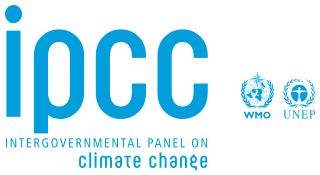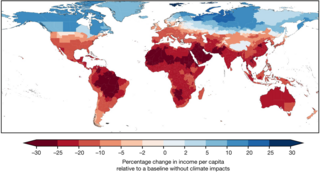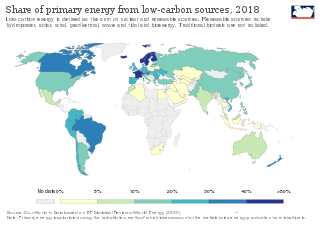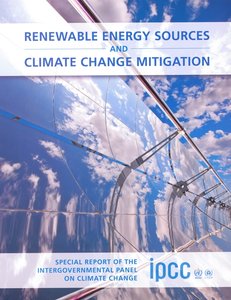
The Intergovernmental Panel on Climate Change (IPCC) is an intergovernmental body of the United Nations. Its job is to advance scientific knowledge about climate change caused by human activities. The World Meteorological Organization (WMO) and the United Nations Environment Programme (UNEP) set up the IPCC in 1988. The United Nations endorsed the creation of the IPCC later that year. It has a secretariat in Geneva, Switzerland, hosted by the WMO. It has 195 member states who govern the IPCC. The member states elect a bureau of scientists to serve through an assessment cycle. A cycle is usually six to seven years. The bureau selects experts in their fields to prepare IPCC reports. There is a formal nomination process by governments and observer organizations to find these experts. The IPCC has three working groups and a task force, which carry out its scientific work.

The United Nations Environment Programme (UNEP) is responsible for coordinating responses to environmental issues within the United Nations system. It was established by Maurice Strong, its first director, after the United Nations Conference on the Human Environment in Stockholm in June 1972. Its mandate is to provide leadership, deliver science and develop solutions on a wide range of issues, including climate change, the management of marine and terrestrial ecosystems, and green economic development. The organization also develops international environmental agreements; publishes and promotes environmental science and helps national governments achieve environmental targets.

Climate change mitigation (or decarbonisation) is action to limit the greenhouse gases in the atmosphere that cause climate change. Climate change mitigation actions include conserving energy and replacing fossil fuels with clean energy sources. Secondary mitigation strategies include changes to land use and removing carbon dioxide (CO2) from the atmosphere. Current climate change mitigation policies are insufficient as they would still result in global warming of about 2.7 °C by 2100, significantly above the 2015 Paris Agreement's goal of limiting global warming to below 2 °C.

An economic analysis of climate change uses economic tools and models to calculate the magnitude and distribution of damages caused by climate change. It can also give guidance for the best policies for mitigation and adaptation to climate change from an economic perspective. There are many economic models and frameworks. For example, in a cost–benefit analysis, the trade offs between climate change impacts, adaptation, and mitigation are made explicit. For this kind of analysis, integrated assessment models (IAMs) are useful. Those models link main features of society and economy with the biosphere and atmosphere into one modelling framework. The total economic impacts from climate change are difficult to estimate. In general, they increase the more the global surface temperature increases.

Land use, land-use change, and forestry (LULUCF), also referred to as Forestry and other land use (FOLU) or Agriculture, Forestry and Other Land Use (AFOLU), is defined as a "greenhouse gas inventory sector that covers emissions and removals of greenhouse gases resulting from direct human-induced land use such as settlements and commercial uses, land-use change, and forestry activities."
The Global Scenario Group (GSG) was an international, interdisciplinary body convened in 1995 by the Tellus Institute and the Stockholm Environment Institute (SEI) to develop scenarios for world development in the twenty-first century. Further development of the Great Transition scenarios has been carried on by the Great Transition Initiative (GTI).

In the context of energy production, biomass is matter from recently living organisms which is used for bioenergy production. Examples include wood, wood residues, energy crops, agricultural residues including straw, and organic waste from industry and households. Wood and wood residues is the largest biomass energy source today. Wood can be used as a fuel directly or processed into pellet fuel or other forms of fuels. Other plants can also be used as fuel, for instance maize, switchgrass, miscanthus and bamboo. The main waste feedstocks are wood waste, agricultural waste, municipal solid waste, and manufacturing waste. Upgrading raw biomass to higher grade fuels can be achieved by different methods, broadly classified as thermal, chemical, or biochemical.

A low-carbon economy (LCE) is an economy which absorbs as much greenhouse gas as it emits. Greenhouse gas (GHG) emissions due to human activity are the dominant cause of observed climate change since the mid-20th century. There are many proven approaches for moving to a low-carbon economy, such as encouraging renewable energy transition, energy conservation, and electrification of transportation. An example are zero-carbon cities.

In ecology, resilience is the capacity of an ecosystem to respond to a perturbation or disturbance by resisting damage and subsequently recovering. Such perturbations and disturbances can include stochastic events such as fires, flooding, windstorms, insect population explosions, and human activities such as deforestation, fracking of the ground for oil extraction, pesticide sprayed in soil, and the introduction of exotic plant or animal species. Disturbances of sufficient magnitude or duration can profoundly affect an ecosystem and may force an ecosystem to reach a threshold beyond which a different regime of processes and structures predominates. When such thresholds are associated with a critical or bifurcation point, these regime shifts may also be referred to as critical transitions.

Low-carbon electricity or low-carbon power is electricity produced with substantially lower greenhouse gas emissions over the entire lifecycle than power generation using fossil fuels. The energy transition to low-carbon power is one of the most important actions required to limit climate change.

The United Nations Intergovernmental Panel on Climate Change (IPCC) published a special report on Renewable Energy Sources and Climate Change Mitigation (SRREN) on May 9, 2011. The report developed under the leadership of Ottmar Edenhofer evaluates the global potential for using renewable energy to mitigate climate change. This IPCC special report provides broader coverage of renewable energy than was included in the IPCC's 2007 climate change assessment report, as well as stronger renewable energy policy coverage.

The Potsdam Institute for Climate Impact Research is a German government-funded research institute addressing crucial scientific questions in the fields of global change, climate impacts, and sustainable development. Ranked among the top environmental think tanks worldwide, it is one of the leading research institutions and part of a global network of scientific and academic institutions working on questions of global environmental change. It is a member of the Leibniz Association, whose institutions perform research on subjects of high relevance to society.

The contributions of women in climate change have received increasing attention in the early 21st century. Feedback from women and the issues faced by women have been described as "imperative" by the United Nations and "critical" by the Population Reference Bureau. A report by the World Health Organization concluded that incorporating gender-based analysis would "provide more effective climate change mitigation and adaptation."

Sir James Ferguson "Jim" Skea CBE FRSE is a British academic. He is currently Chair of the Intergovernmental Panel on Climate Change (IPCC) for its seventh assessment cycle, and a Professor of Sustainable Energy at Imperial College London. Before being elected as Chair, Skea was Co-Chair of Working Group III of the IPCC. He was a founding member of the UK Government's Committee on Climate Change and currently chairs Scotland's Just Transition Commission. He was a co-author of the IPCC 2018 Special Report on Global Warming of 1.5 °C. In July 2023, Skea was elected as Chair of the IPCC.
William R. Moomaw is the Professor Emeritus of International Environmental Policy at the Fletcher School, Tufts University. Moomaw has worked at the intersection of science and policy, advocating for international sustainable development. His activities have included being a long-time contributor to the Intergovernmental Panel on Climate Change and an author on the seminal "Perspective" paper on proforestation.

Fatima Denton is a British-Gambian climatologist. She is the director at the Ghanaian branch of the United Nations University, at the UNU Institute for Natural Resources in Africa (UNU-INRA) in Accra. She focuses on innovation, science, technology and natural resource management. She partners with countries such as Benin and Liberia to develop and implement country needs assessment missions.
Diana Ürge-Vorsatz is a Hungarian scientist. She is a Vice-Chair of the IPCC, and professor of Environmental Sciences at Central European University. She is the Director of the Center for Climate Change and Sustainable Energy Policy. She has published widely on environmental and energy studies, primarily climate change mitigation.

The United Nations' Intergovernmental Panel on Climate Change's (IPCC) Special Report on Climate Change and Land (SRCCL), also known as the "Special Report on climate change, desertification, land degradation, sustainable land management, food security, and greenhouse gas fluxes in terrestrial ecosystems", is a landmark study from 2019 by 107 experts from 52 countries. The SRCCL provides a comprehensive overview of the entire land-climate system for the first time and decided to enlist land as a "critical resource". The IPCC's 50th session (IPCC-50) formally adopted the SRCCL's Summary for policymakers (SPM) and approved the underlying report. The SPM and the full text of Special Report on Climate Change and Land—in an unedited form—were released on 8 August 2019. The report is over 1,300 pages long and includes the work of 107 experts from 52 countries.

The Sixth Assessment Report (AR6) of the United Nations (UN) Intergovernmental Panel on Climate Change (IPCC) is the sixth in a series of reports which assess the available scientific information on climate change. Three Working Groups covered the following topics: The Physical Science Basis (WGI); Impacts, Adaptation and Vulnerability (WGII); Mitigation of Climate Change (WGIII). Of these, the first study was published in 2021, the second report February 2022, and the third in April 2022. The final synthesis report was finished in March 2023.